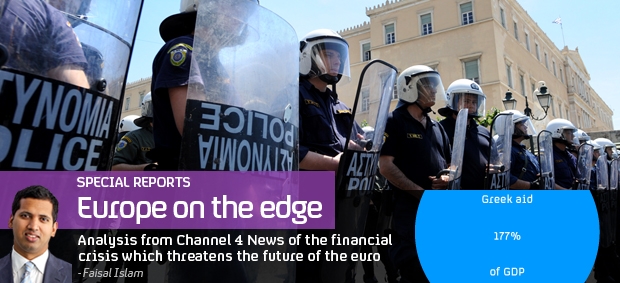‘Greece will not meet bailout terms’
The future of the euro is under the spotlight again, as EU officials visiting Greece cast doubt on its ability to repay its debts and Spain sees its borrowing costs soar.
Officials from the European Union, European Central Bank and International Monetary Fund are in Athens to assess the progress Greece has made in meeting the terms of the bailout it has received.
They are making a decision on whether Greece has done enough to qualify for the final tranche of bailout money – 31.5bn euros – it was granted in March, but EU officials said on Tuesday they were likely to conclude that Athens could not repay its debts, making a further debt restructuring necessary.
The ECB and eurozone governments could decide to take a hit on some of the 200bn euros of Greek government debt they own, but there is little appetite for doing this, and Greece could be forced out of the euro if a solution is not found. This could have a knock-on effect in Spain and Italy.
‘Hugely off track’
One anonymous official told Reuters: “Greece is hugely off track. The debt-sustainability analysis will be pretty terrible.”
Greek Prime Minister Antonis Samaras, pictured above, said the economy, in its fifth year of recession, was likely to contract by 7 per cent this year, making it more difficult for the country to deal with its debts.
He said: “There are certainly delays in this year’s agreed programme and we must quickly catch up. Let’s not kid ourselves, there is still big waste in the public sector and it must stop.”
AAA
The turmoil in the eurozone has also hit Germany, with its prized AAA credit rating now being questioned because of its links to Greece and Spain.
The ratings agency Moody’s decision to reclassify Berlin’s rating from stable to negative was followed by a rise in Spain’s borrowing costs – due to investors’ fears that the country may need to be bailed out.
Moody’s also put AAA countries Holland and Luxembourg on negative watch and warned that Spain would need more support.
Spain
Spain’s banks have been granted a £100bn bailout, but Valencia is requesting financial help from the Madrid government to enable it to meet its debt repayments, and Catalonia and other regions may follow suit. This adds to pressure for a bailout of the entire Spanish economy, rather than just the financial sector.
It is significant that on Tuesday, it cost Spain more to borrow over the short term than the long term, a sign that the bond markets believe a default is possible or a debt restructuring is needed.
Despite concerns about Spain, and the possibility that Italy could be dragged down too, it is Greece that remains most vulnerable.
With Germany’s AAA rating now under threat, many Germans are losing patience with Greece and the feeling is taking hold that Greece and the eurozone would be better off if it left the single currency bloc and returned to the drachma.
This argument is now being put forward by leading figures from Germany’s Free Democrats party, which is in coalition with Chancellor Angela Merkel’s Christian Democrats.
The party’s leader Philipp Roesler said at the weekend that he was sceptical that Greece would be able to meet the terms of its aid package and that a Greek exit from the euro “has lost its fear factor”.
Public opinion
German public opinion is also hardening, with a recent poll revealing that 83 per cent of people believe Greece should leave the euro if it fails to meet the bailout conditions.
This was before Germany’s AAA status was called into question, and the German government is likely to find itself under pressure to take an even tougher stance with Greece than it has until now.
It is in a difficult position: cut Greece some slack and face criticism at home; respond to German public opinion and expect further protests in Greece and reminders about its wartime past.
 >
>